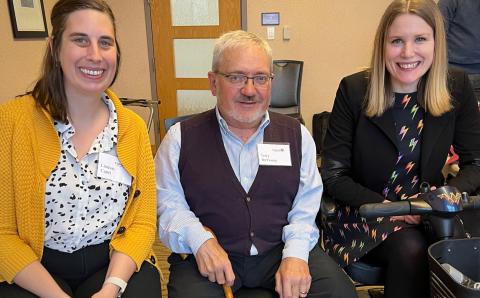The “Romans Road” I’m talking about here is not the amazing system of roads throughout the Roman Empire that providentially enabled Paul to bring the gospel throughout the empire. Instead I’m talking about the popular and misleading presentation of the gospel that has been promoted for many years. In simple form it goes like this:
- “All have sinned and fall short of the glory of God” (Rom. 3:23).
- The punishment for sin is eternal death (hell), but the free gift of God is eternal life through Jesus Christ (Rom. 6:23).
- God showed his love for us by sending Jesus to die for our sins and saving us from God’s wrath (Rom. 5:9).
- Whoever believes in Jesus will be forgiven of their sins (Rom. 8:1) and enjoy peace with God (Rom. 5:1).
- Those who believe in Jesus will be saved and go to heaven when they die (Rom. 10:9).
This is believed to be the essence of the gospel according to Paul.
In the past 30 years there has been a tremendous resurgence of Pauline studies led by such reliable scholars as N.T. Wright, John Barclay, and E.P. Sanders, all of them deeply committed Christian believers who together have challenged this traditional understanding of Paul’s gospel and invited us to do some fundamental rebuilding of the “Romans Road.”
1. Sin is slavery to spiritual powers. No one, of course, disputes the basic fact that we are all sinners. But Paul sees this sin problem as much deeper than the tendency toward sinfulness we all experience. All through his epistles, Paul describes sin as a fundamental captivity to the spiritual principalities and powers of darkness that are in control of the world and human life in this age. (See Eph. 6:21-22.)
This also means that our deliverance from sin involves far more than a simple transaction by which Christ died for our sin and grants us forgiveness. It means being freed from slavery to the powers of darkness and placed under a new power. This is exactly how Paul describes it in Colossians 1:13-14: “He has rescued us from the dominion of darkness and brought us into the kingdom of the Son he loves, in whom we have redemption, the forgiveness of sins.”
Paul then explains this further: “God made you alive with Christ. He forgave us all our sins; … he has taken it away, nailing it to the cross. And having disarmed the powers and authorities, he made a public spectacle of them, triumphing over them by the cross” (Col. 2:13-15). Our forgiveness is part of a much bigger cosmic victory over the evil powers that enslave us.
2. Faith means transformation. We typically understand faith in Christ to mean simply believing in him—that is, believing as a fact that Jesus died for our sins. However, recent biblical scholarship challenges the idea that faith means simple belief. Intensive study of the use of the Greek word for faith shows that it means believing in Jesus in such a way we offer him our total allegiance and obedience. He is our Lord as well as our Savior.
Faith means more than accepting Christ’s forgiveness. It involves the complete transformation of our lives by the Holy Spirit. By faith, through baptism we enter a whole new identity by truly becoming disciples of Jesus, following his commandments and imitating his way of life. This deeper meaning of faith is contained in the title of my old catechism booklet for teens, “Saved to Serve.”
3. Faith and works, not faith or works. A truncated understanding of faith leads to another problem with the typical “Romans Road” gospel. It tends to promote the idea that we are saved by believing in Jesus (as simply assent) rather than by a transformative faith that produces good works. Of course, Paul does talk about the uselessness of certain kinds of works—the works of the law. “We … have put our faith in Christ Jesus that we may be justified by faith in Christ and not by the works of the law, because by the works of the law no one will be justified” (Gal. 2:16).
By “law” Paul means obedience to the statutes of the Old Covenant of the Torah, such as circumcision. For Paul, there is no fundamental opposition between faith and works, but only between faith and the kind of works that rely on external religious rites. For him, faith is an allegiance to Christ leading to a transformation exhibited in the kinds of good works that demonstrate a person is truly his disciple.
It might come as a surprise to many of us that every single text that speaks of the final judgment in the New Testament clearly states that it is based on works rather than bare faith in Christ. Just two examples can represent all of them: “Not everyone who says to me, ‘Lord, Lord,’ will enter the kingdom of heaven, but only the one who does the will of my Father who is in heaven” (Matt. 7:21), and “For we must all appear before the judgment seat of Christ, so that each of us may receive what is due us for the things done while in the body, whether good or bad” (2 Cor. 5:10). To appear before God barren of the transforming works of the Holy Spirit is a daunting prospect.
Perhaps the fullest statement of the gospel’s transforming power occurs right in the middle of Romans: “Therefore, there is now no condemnation for those who are in Christ Jesus, because through Christ Jesus the law of the Spirit who gives life has set you free from the law of sin and death. … And so he condemned sin in the flesh, in order that the righteous requirement of the law might be fully met in us, who do not live according to the flesh but according to the Spirit (Rom. 8:1-4). Authentic faith shows itself in the transforming power of the Holy Spirit, who enables us to fulfill God’s fundamental law, the law of love.
The “Romans Road” gospel implies that if I only believe that Jesus died for my sins and pray the “sinner’s prayer” I will go to heaven. We sometimes talk as though justification and sanctification are two separate departments of which the first is necessary and the second is optional. The sad result is a church bloated with “believers” but thin of transformed disciples. Jesus doesn’t just assure us he died for our sins; he invites us to take up our cross and follow him.
Of course, none of us fully lives up to what Paul calls the “measure of the full stature of Christ” (Eph. 4:13, NRSV). But to have faith in Jesus means that we constantly renounce the works of darkness and open our hearts to the transforming power of the Holy Spirit.
The Christian Reformed Church’s own contemporary testimony, Our World Belongs to God, proclaims a cosmic gospel that exposes the inadequacy of the “Romans Road.”
We rejoice in the goodness of God, renounce the works of darkness,
and dedicate ourselves to holy living. As covenant partners, set free for joyful obedience, we offer our hearts and lives to do God’s work in the world. With tempered impatience, eager to see injustice ended, we expect the Day of the Lord. We are confident that the light which shines in the present darkness will fill the earth when Christ appears. Come, Lord Jesus. Our world belongs to you (Art. 6).
Suggested reading
Matthew Bates, Gospel Allegiance: What Faith in Jesus Misses for Salvation in Christ (Brazos, 2019)
David deSilva, Transformation: The Heart of Paul’s Gospel (Lexham Press, 2014)
N.T. Wright, Romans: N.T. Wright For Everyone Bible Study Guides (IVP Connect, 2009)
Discussion Questions
- What did you previously know of the “Romans Road”? In what context?
- What do you think of the difference between faith as simply belief and faith as total allegiance to Christ?
- How have you navigated the balance between faith and works?
- How do you feel and respond to the statement, “a church bloated with ‘believers’ but thin of transformed disciples”?
About the Author
Len Vander Zee is a retired CRC pastor now serving as interim minister of preaching at Church of the Servant CRC in Grand Rapids, Mich.









